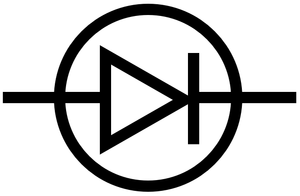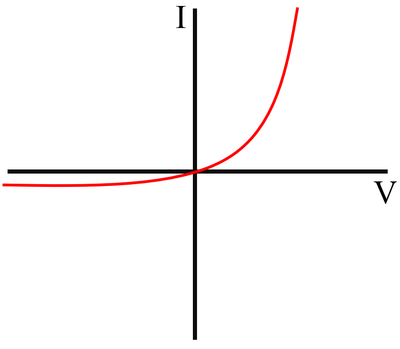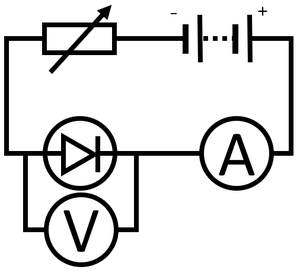Difference between revisions of "Diode"
| Line 20: | Line 20: | ||
====Explanation==== | ====Explanation==== | ||
: The [[Electrical Resistance|resistance]] of a [[diode]] is very low for [[Electrical Current|current]] in the forward direction and very high in the back direction. | : The [[Electrical Resistance|resistance]] of a [[diode]] is very low for [[Electrical Current|current]] in the forward direction and very high in the back direction. | ||
| + | |||
| + | ====Obtaining the IV Graph==== | ||
| + | {| class="wikitable" | ||
| + | |- | ||
| + | |[[File:DiodeIVGraphCircuit.png|center|300px]] | ||
| + | | style="height:20px; width:300px; text-align:left;" | | ||
| + | #Connect an [[ammeter]] in [[Series Circuit|series]] with the [[diode]] to measure [[Electrical Current|current]] through the [[diode]]. | ||
| + | #Connect a [[voltmeter]] in [[Parallel Circuit|parallel]] with the [[diode]] to measure the [[Potential Difference|potential difference]] across it. | ||
| + | #Use a [[Variable Resistor|variable resistor]] in [[Series Circuit|series]] with the [[diode]] to vary the [[Potential Difference|potential difference]] across the [[diode]]. | ||
| + | #Start with a [[Potential Difference|potential difference]] of zero and increase the [[Potential Difference|potential difference]] by an interval of 0.2V up to 2V. | ||
| + | #Recording the reading on the [[voltmeter]] and [[ammeter]]. | ||
| + | #Reverse the connections on the [[battery]] and repeat steps 4 and 5 to find the I-V relationship for negative [[Potential Difference|potential difference]] and [[Electrical Current|current]]. | ||
| + | |} | ||
Revision as of 18:16, 28 February 2019
Contents
Key Stage 4
Meaning
A diode is an electrical component which only allows electricity through in one direction.
About Diodes
- Diodes have a low resistance in one direction but a very high resistance in the reverse direction.
- Diodes can be used to change an alternating current into a direct current.
IV Graph
Description
The IV Graph for a diode shows that:
- For a positive potential difference the current increases rapidly with an increase in potential difference
- For a negative potential difference the current remains negligible and does not increase as the potential difference becomes larger.
Explanation
- The resistance of a diode is very low for current in the forward direction and very high in the back direction.
Obtaining the IV Graph
|


